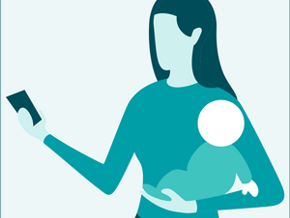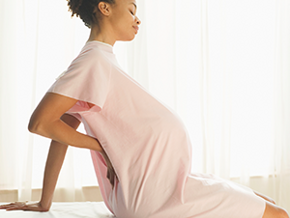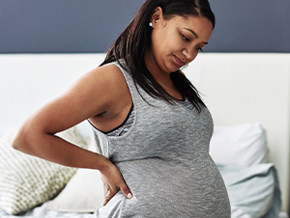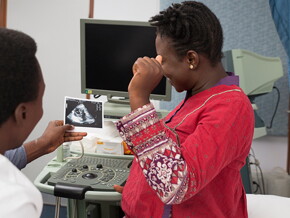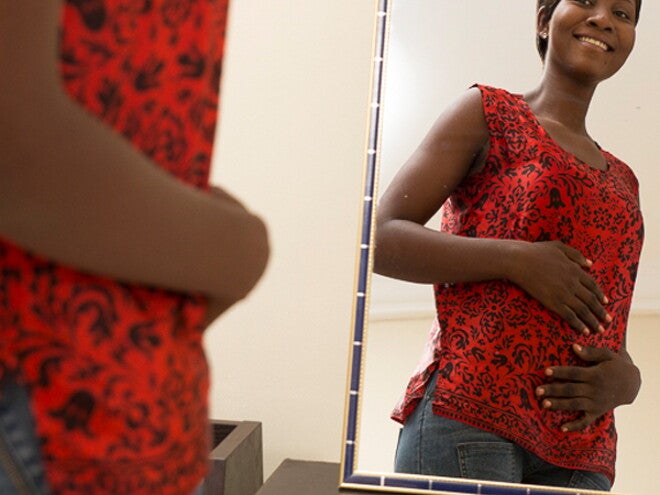
Pregnancy diet: Before, during & after
Eating well: It helps you…
Maintain a healthy weight
How?
Help yourself gain weight at a healthy rate with sensible meal choices during pregnancy.
Why?
You’ll improve your chances of having a healthy, full-term baby with a lower risk of health problems..
Meet your increased need for iron
How?
Incorporate lots of iron-rich foods into your diet, before, during and after pregnancy.
Why?
You’ll help prevent iron deficiency and anaemia (plus, the fatigue and decreased energy levels they can cause), as well as potential premature delivery and low birth weight.
What else?
Regulary attend your antenatal clinics with your Health Care Professionals.
Get the energy you need
How?
Eat about about 300 extra calories per day during your second and third trimester.
Why?
What else?
Remember, eating for two doesn’t mean eating twice as much!
Choose essential nutrients
How?
Pick out healthy options including dairy products ideally with reduced fat options limiting the amounts of sugar, salt, fats and oils used in meal preparation
Why?
Dairy products provide calcium, as well as protein, vitamin D, B vitamins, and magnesium—all essential for the development of your baby’s bones, muscles, and nerves. Meals high in sugar,fat and salt increases your risk of developing conditions such as pregnancy related diabetes and pre-eclampsia.
Speed your recovery after delivery
How?
Eat energy-rich and nutrient-rich foods.
Why?
Good nutrition is essential to your body recovering after your baby is born.
Navigate common pregnancy concerns
How?
Even though you may not be able to predict how your body will respond and cope with pregnancy (serious complications are rare, fortunately), keep yourself ready for what most women go through by maintaining a good diet.
Why?
You can minimize, and often avoid, heartburn, constipation, fatigue, mood swings, and other minor nuisances which are often associated with pregnancies.
Eating well: It helps your baby…
Get enough folic acid early in your pregnancy
How?
Ensure you have a varied and balanced diet containing folic acid-rich foods like green leafy vegetables, eggs etc. In addition, add a prenatal multivitamin containing folic acid as prescribed by your health care professional.
Why?
You’ll be lessening the chance of neural tube defects, such as spina bifida, that often occur before most women even know they’re pregnant.
What else?
WHO recommends that all women from the moment they begin trying to conceive until 12 weeks into pregnancy should take 400µg of folic acid# . Ideally, speak to your Health Care Professional when you start thinking about having a baby and throughout pregnancy to help prevent neural tube defects.
Benefit from high quality protein
How?
Eat a healthy amount of meats, chicken, fish, beans, milk, and eggs right from the start.
Why?
You want to maximize the potential for your baby to have well developed ligaments, hair, fingernails, bones, brain tissue, blood, and other tissues. Get enough calcium
How?
Consume 1000 mg of calcium a day with dairy. (You’re right, you’re not restricted to just milk—¾ cup of yoghurt, 50 g of cheese or a cup of a fortified soy (soya milk with vitamins) beverage can replace one cup of milk.)
Why?
This provides calcium that contributes to healthy bones and teeth for the baby, preventing the use of calcium from your bones.
What else?
Many vegetables and legumes, such as spinach, cocoyam leaves, and cowpea (beans) are also sources of calcium. Arrive at a healthy birth weight.
Why?
Increase your likelihood of having a healthy, strong baby.
Fantastic Fibre
You’re about to discover (hopefully not first-hand) that pregnancy can also carry some digestive tract problems—including constipation and haemorrhoids (piles). Fortunately, there’s usually a simple explanation and getting enough fibre can help minimize or alleviate these issues. You can help even more by staying active and making lots of fluids part of that active lifestyle. Drinking 8 glasses of water each day, can play a role in relieving the discomfort of constipation.
The recommended daily fibre intake during pregnancy is 28 grams.3
Get your 28 grams of fibre with help from a well-planned diet that includes a variety of fruits, vegetables, whole grains, peas, beans and lentils, nuts and seeds.
Know your type
Each of these two types of fibre, which you’ll only find in plant foods, has a different function.
Insoluble fibre
- Keeps the digestive system in good working order.
- Helps soften stools (it’s a natural laxative, after all).
- Speeds up the movement of waste material through the digestive system Good dietary sources of insoluble fibre: Whole grains, wheat bran cereal, vegetables, fruits, as well as peas and beans.
Soluble fibre
- Helps lower blood cholesterol levels.
- Regulates blood sugar levels.
- Needs to make up about 10 grams of your daily fibre intake.
Good dietary sources of soluble fibre include: Fruits, vegetables, oats, peas and beans.
Digestive Disturbances
As your pregnancy progresses, your digestive system may react to your body’s changes.
First trimester
You may have some nausea, food aversions, or cravings that can disturb the normal digestive process.
Second trimester
Slower digestion can result in constipation. (The hormone progesterone would have kicked in by now—it relaxes the smooth muscles lining the digestive tract which slows the process of digestion.)
Third trimester
Elimination can become difficult, sometimes leading to haemorrhoids (piles). (Your growing baby is now engaging and pressing on some of your internal organs and blood vessels, making your digestive system work less smoothly than you’d like.)
By now it probably goes without saying, a healthy diet and enough fibre are super-important to your baby and you—especially when it comes to possible digestive disturbances.
Pregnancy cravings
- Cravings are by-products of your pregnancy hormones (same goes for aversions).
- Common favourites? Sweets, fruits, salty or spicy foods, and hard or chewy foods top most expectant Mum’s lists.
- Craving junk? Seek out a healthier alternative
Pregnancy aversions
- Strong aversions to foods are common during pregnancy, especially during the first trimester.
- Got an aversion to a nutritious food? Substitute an equally nutrient-dense food. (Fish? Yuck! Guess I’ll settle for chicken—it’s high in protein.)
With both food cravings and aversions, it’s best to follow your body’s signals—all the while, (and this goes for your diet in general), make healthy choices.
References:
# Standards for Maternal and Neonatal Care (Integrated Management of Pregnancy and Childbirth), WHO 2007
2 Wilson RD et al. Pre-conception Folic Acid and Multivitamin Supplementation for the Primary and Secondary Prevention of Neural Tube Defects and Other Folic Acid-Sensitive Congenital Anomalies. SOGC Clinical Practice Guideline, No. 324. J Obstet Gynaecol Can. 2015;29(12):1003-1013.
3 Daily Adequate Intake (AI) of total fibre for pregnant women aged 19-50 years old (Institute of Medicine. Dietary, Functional and Total Fiber. In: Dietary reference intakes for energy, carbohydrate, fiber, fat, fatty acids, cholesterol, protein, and amino acids. Washington: National Academies Press, 2005.)






